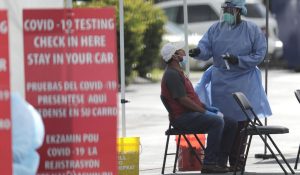We think of COVID-19 as killing primarily the elderly around the world, but in poor countries it is more cataclysmic than that.
It is killing children through malnutrition. It is leading more people to die from tuberculosis, malaria and AIDS. It is forcing girls out of school and into child marriages. It is causing women to die in childbirth. It is setting back efforts to eradicate polio, fight malaria and reduce female genital mutilation. It is leading to lapses in vitamin A distribution that will cause more children to suffer blindness and die.
The U.N. Population Fund warns that COVID-19 may lead to an additional 13 million child marriages around the world and to some 47 million women being unable to get access to modern contraception.
In short, a pandemic of disease, illiteracy and extreme poverty is following on the heels of this coronavirus pandemic — and it is hitting children hardest.
The greatest impact of COVID-19 may be not on those whom the virus directly infects, but on those shattered by the collapse of economies and health and education systems in developing countries. Many schools and clinics are closed, medicines for AIDS and other ailments are sometimes unavailable, and campaigns against malaria and genital mutilation are often suspended.
“The indirect impact of COVID-19 in the Global South will be even greater than the direct impact,” Dr. Muhammad Musa, executive director of BRAC International, an outstanding Bangladesh-based nonprofit, told me. “The direct impact, as tragic as it is, affects those infected and their families. The indirect impact has economic and social consequences for vastly more people — with jobs lost, families hungry, domestic violence up, more children leaving school, and costs over generations.”
In this sense, many of those whom COVID-19 kills never actually get the disease. Instead, they are children who die of measles because they couldn’t get vaccinated in a time of plague — up to 80 million children may miss vaccinations. Or they die of malnutrition because their fathers lost jobs as rickshaw drivers or their mothers couldn’t sell vegetables in the market.
As is often the case in economic crises, the burden falls particularly on girls. More are being married off as children so that the new husband’s family will feed them, or they are sent off to the city to work as maids in exchange for food and negligible incomes — while facing an end to education and significant risk of abuse.
“The major challenge being faced by students is hunger,” said Angeline Murimirwa, executive director for Africa of Camfed International, which supports girls’ education in developing countries. More than 60% of Camfed’s students in Malawi report suffering a lack of food.
Before this crisis, 4% of girls in Zimbabwe married by 14. That figure may now worsen.
Bill Gates and others are calling on Congress to include $4 billion in the next American stimulus package to help ensure that everyone worldwide can get vaccinated for the coronavirus. Don’t think of that as charity, but as an investment in global health security — and we also need emergency investments for education, polio and nutrition.
But, so far, rich countries have mostly been self-absorbed and small-minded, not considering that a distant outbreak can again cross their own borders. A U.N. appeal for $10 billion for COVID-19 response has raised only about a quarter of that.
At the turn of each year recently, I’ve written a column arguing that the previous year was the best in human history, based on such metrics as the risk that a child will die or remain illiterate. I won’t be able to write such a column this winter, or perhaps for years to come.
I asked Mark Lowcock, the United Nations’ humanitarian chief. if COVID-19 is a setback for that era of progress, or a bookend.
“At a minimum this is going to be a significant blip,” he said. “If we’re not careful, it’s going to be worse than a blip. It could knock back for decades some of the progress that has been made.”
Nicholas D. Kristof is a New York Times columnist.



















